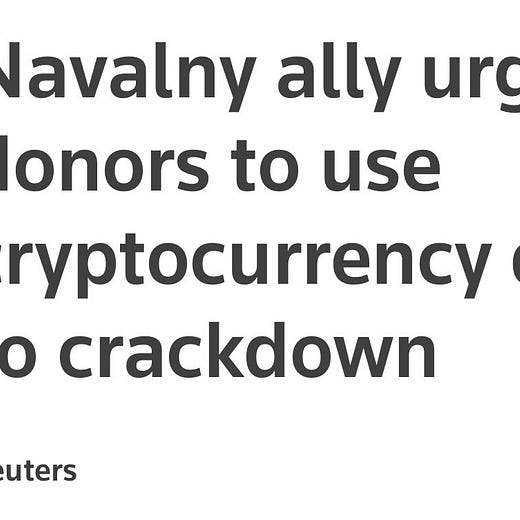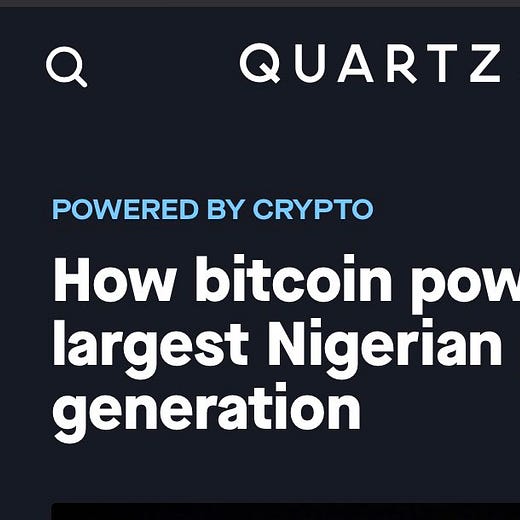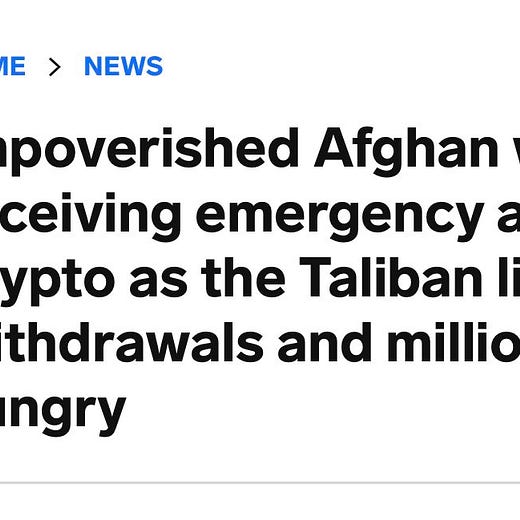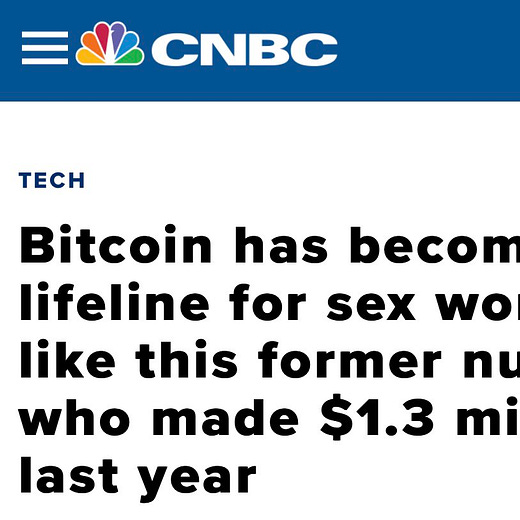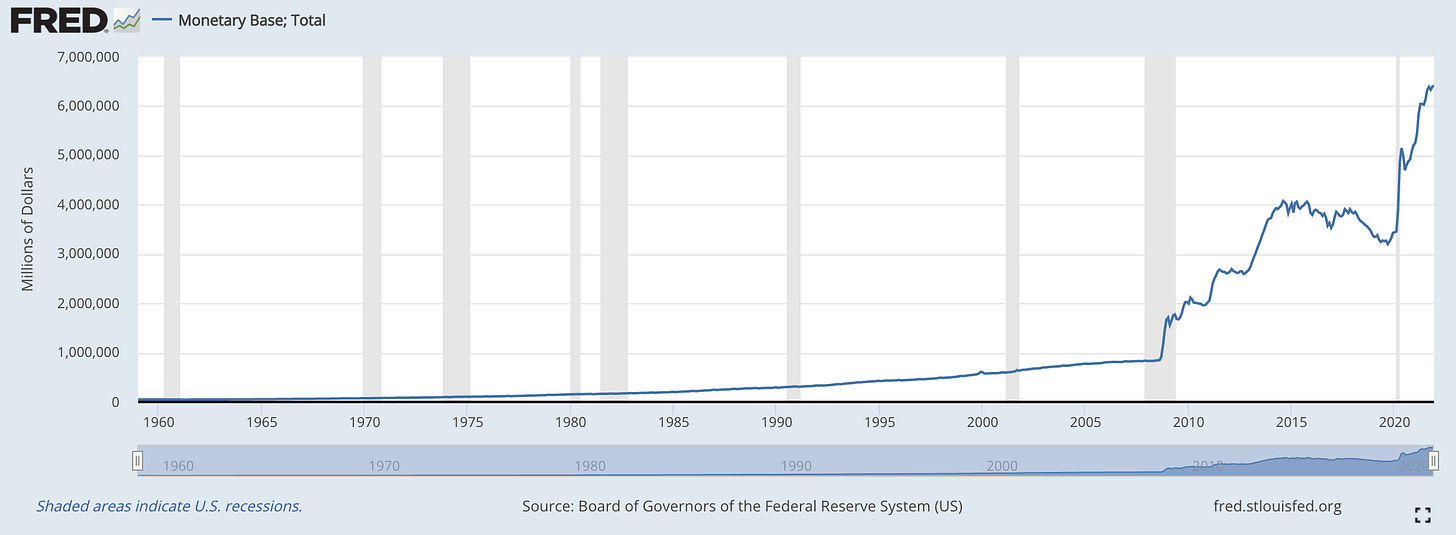The Progressive Case for Bitcoin
Bitcoin is not a conservative movement. It is a tool for everyone.
Increasingly the American political left is treating Bitcoin (and other crypto technology) as a right-wing phenomenon, but that is a mistake — both factually and strategically. Bitcoin is completely compatible with progressive/left-liberal ideologies and it is a critical tool in the defense of global freedom and the fight against climate change. Instead of fearing Bitcoin, progressives should embrace it.
In this issue:
Bitcoin is neither right nor left it is forward
Bitcoin is good for the planet
Bitcoin protects the marginalized
Bitcoin limits the power of Wall St
Bitcoin is for everyone
Bitcoin is neither right nor left it is forward
In the current era of American politics it is mandatory for all topics to be branded either RED or BLUE. Wearing a mask and getting vaccinated is BLUE. Owning and/or believing in cryptocurrency is RED. Partisan political branding is excellent for cable-news viewership and social media engagement but it is a terrible way to understand the world. Reality does not care whether you are team RED or team BLUE. Everyone should wear a mask. Everyone should own some Bitcoin.
As someone whose personal politics run left-of-center I am frustrated by how eagerly progressives have turned distaste for cryptocurrency into a tribal shibboleth. It is the symmetric opposite of the mistake made by those who politicize covid safety. There is no reason for the political left to abandon Bitcoin to the right. Doing so impoverishes the movement both metaphorically and literally.
Bitcoin is not right wing — it is a technology, not an ideology. Bitcoin is just a tool for storing and moving wealth. It doesn’t imply anything about what that wealth should be used to accomplish. People tend to assume that a hard currency has to mean a small government but that doesn’t have to be true. Collectivist philosophy goes back centuries, unbacked fiat currency only goes back to the 1970s. It is entirely possible to fund collective projects with hard money — it just means paying for things with taxation instead of with debt.
Paying for things with taxation is tough on the wealthy because they prefer to keep their money, but paying for things with debt is great for them because debt is very profitable for banks and wealthy people are more likely to own banks. Paying for things with debt is terrible for the poor, however, because creating more money eventually causes inflation. Inflation is a stealth tax on the poor. The more of your wealth that you hold in cash or future cash-denominated wages the more inflation will damage your purchasing power.
So paying for social programs is progressive, but paying for social programs through debt is not progressive at all. Treating hard money as if it is in conflict with progressive governance is political sleight-of-hand.
We can have good money and tax it, too.
Bitcoin is good for the planet
The single most important challenge facing our planet is how to transition society to clean and renewable energy. We need to find ways to make renewable energy price competitive with fossil fuels — or we will keep burning fossil fuels. Finding a way to make renewables cheaper is our only way out. Fortunately that’s exactly what Bitcoin does — it makes renewable energy cheaper and more abundant.
Renewable energy is actually already quite cheap to produce. The sun shines for free! The problem is that renewable energy plants are the least profitable when they are the most efficient — wind-turbines produce lots of power when the wind is blowing fiercely, but that same power has to be immediately sold into a flooded market. Prices can even go negative, where producers must pay consumers to dispose of excess power.
Bitcoin offers a backstop defense for renewable power producers by serving as a "buyer of last resort" for otherwise wasted energy. That means Bitcoin creates a brand new revenue stream for renewable energy producers — which encourages the production of more renewable energy. Bitcoin miners effectively subsidize the creation of additional renewable energy capacity for everyone by turning energy that no one wants into a valuable resource.
There are other kinds of waste energy that Bitcoin can help rescue. Oil mining for example produces natural gas as a side effect in areas where it is too remote to be easily sold — so they just set it on fire. There are Bitcoin companies that bring mobile mining rigs on site to these vents to use the gas instead of flaring it, which is much better for the environment because flaring can release methane and NOx into the atmosphere as well.
Whenever one of these on-site mining rigs turns on Bitcoin’s total energy use goes up, but the impact on the environment is actually quite positive. And this isn’t a corner case — by the estimate of the CBECI there is enough natural gas venting globally to power the Bitcoin network ~5.5x over. Viewed through the narrow lens of energy use Bitcoin might seem like a threat but the truth is energy use isn’t actually a very good proxy for environmental impact.
Even if the price of Bitcoin grows arbitrarily large it won’t overwhelm our power grids because it will still be cheaper for miners to seek out or produce new power no one wanted than to outbid anyone else. Miners who can operate more cheaply will outcompete those who are overpaying for power. The fact that Bitcoin is profitable to mine at ordinary power prices isn’t because the price of Bitcoin has grown so large it is because it has grown so quickly. It takes time for more efficient mining operations to be built and come online.
Bemoaning new technology on the basis of energy use is nothing new and it isn’t specific to Bitcoin. Back in 1999 we had the same conversation about personal computers and the Internet:
The opening paragraphs of this piece are eerily familiar — they could easily have been written about the Bitcoin network today, with energy/transaction taking the rhetorical place of lumps-of-coal/megabyte. It wasn’t a good way to understand the Internet in 1999 and it isn’t a good way to understand Bitcoin in 2022.
Bitcoin converts waste energy into a subsidy for renewable energy, making renewable energy cheaper and more abundant. Far from an environmental threat Bitcoin is a key economic tool that can help us pull society into a renewable energy future. If you are serious about the fight against climate change, Bitcoin is an ally.
Bitcoin protects the marginalized
For American liberals, whose primary exposure to cryptocurrency is via well-to-do (and often insufferable) tech industry workers,1 it is understandable that their first impression is that Bitcoin is a plaything for wealthy gamblers — but that anecdotal impression is not the global reality. Actually Bitcoin is most heavily used in countries with weak currencies and/or struggling banking systems, like Vietnam, India, Venezuela, Argentina, Turkey and Nigeria.
Bitcoin is used by feminist protestors in Africa, Afghani women under the rule of the Taliban, by political dissidents in Belarus, by Navalny’s supporters to fund his opposition to Putin and by Sudanese emigrants to send money home. In America Bitcoin is increasingly used by people of color who have been locked out of the traditional financial system for various reasons.
Bitcoin is already a lifeline for people around the world today. Those who consider Bitcoin a plaything for the wealthy aren’t considering everyone else who is using it.
Bitcoin is bad for authoritarians and good for human freedom. That’s why Bitcoin is treated with suspicion and hostility by Trump, Putin, Erdoğan and the CCP. If you are serious about the fight to defend human freedom, Bitcoin is an ally.
Bitcoin limits the power of Wall St
The headline carved forever into the very first block on the Bitcoin blockchain is "The Times 03/Jan/2009 Chancellor on brink of second bailout for banks." Bitcoin launched at the same time and in the same spirit as Occupy Wall St, but using the power of exit instead of the power of voice. For anyone abandoned or exploited by the existing financial system, Bitcoin is a peaceful way to opt out.
The 2008 bank bailouts let the wealthy and powerful outsource the risks of their business models to the public while keeping the profits. They cost a once staggering but now quaint ~$700B. It was a simpler time. Since then our sense of scale has had to readjust to new magnitudes of money creation.
Leaders like Elizabeth Warren and Bernie Sanders have built careers out of protecting people from predatory banks. Given time I think they (and their supporters) will find common cause with Bitcoin. It creates competitive pressure on banks to lower prices and improve services. It provides an alternative for the deplatformed. And it allows anyone to take their wealth out of a system that is actively diluting it for the benefit of wealthy insiders and banks. If you are serious about limiting the power of big banks to extract wealth from ordinary people, Bitcoin is an ally.
Bitcoin is for everyone
The political left in America seems inexplicably eager to let the right set the terms for every conversation. The effort to brand cryptocurrency as right-wing is just the same knee-jerk, self-destructive reflex. Calling Bitcoin "evil" or a "fascist conspiracy" is exactly as useful as calling vaccines a conspiracy. Bitcoin is a technology, not a conspiracy — and it’s an exceptionally useful one. Leaving all the credit and opportunity for conservatives to claim for themselves is a mistake.
Bitcoin is a tool for freedom, a threat to autocrats, a lifeline for the marginalized, a defense against banks and a path forward to a greener future. Bitcoin is for everyone. Progressives should embrace it.
Further reading:
I absolutely despise the terms 'tech-bro' and 'crypto-bro.' There are plenty of legitimate criticisms to be made about equity and inclusion in the tech and cryptocurrency industries, but dismissing everyone in the space as 'bros' is straight up erasure of the women and non-binary people who are contributing to those fields. It is not helpful.





